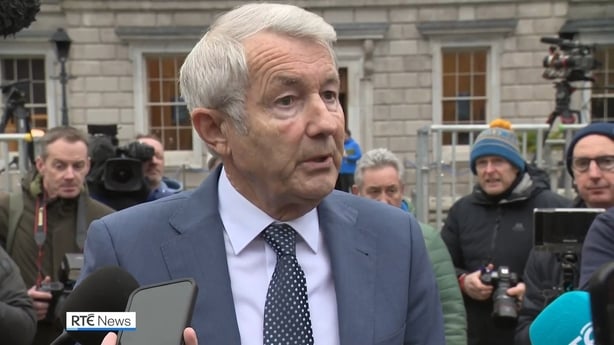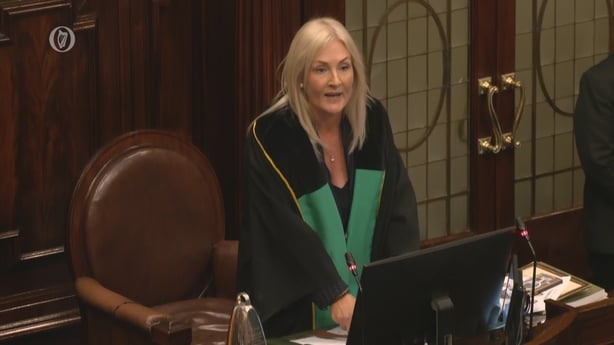It was an extraordinary twist in the tale. Micheál Martin, whose political longevity has been attributed to an unrivalled ability to see around corners, has had his election as Taoiseach stymied by an unforeseen calamity.
The Dáil was abruptly adjourned in chaos at the end of what was supposed to be a day of ceremony. A day when he would - having defied the odds when he took over what was a flailing Fianna Fáil party in 2011 and navigated an evolving political reality since then - become Taoiseach for a second time.
But it wasn't to be.
At about 4.30pm - while Government TDs were applauding a proposal to proceed with the nomination of Mr Martin as Taoiseach, and opposition TDs were on their feet in preparation to walk out - the Ceann Comhairle Verona Murphy called a final halt to seven hours of disorder and disarray.
The House was brought down, leaving a torrent of political turmoil in its wake.
Emotions are running extremely high. The Ceann Comhairle is under pressure. Micheál Martin's government is unable to officially take its place. No one knows what happens next.
And they didn't see it coming.
At its core, the controversy relates to the negotiations around the Programme for Government and what deals were struck behind closed doors, late at night and over takeaway pizzas in Government Buildings.
Faced with the pragmatic reality of needing to form a government, and one that would last five years at that, Fianna Fáil and Fine Gael settled on a group of seven Regional Independents and two Healy-Rae brothers to give them a sizeable majority of 95.
The regional group was led in its negotiations by Tipperary North TD Michael Lowry. The fact that he was the subject of findings by the Moriarty Tribunal 14 years ago did not appear to be overly problematic to either Mr Martin or Simon Harris.

They argued that the Tribunal and events it looked into were a long time ago, Mr Lowry was elected and topped the polls in Tipperary three times since, and the priority was a stable and strong government which needed to be formed quickly.
The deals struck were not just about the Programme for Government. The appointment of a new Ceann Comhairle was also caught up in the arrangement.
Verona Murphy, previously a member of the Regional Independents Group, attributed her decision to stand for the position to Mr Lowry, singling him out for mention in her opening speech as chair.
It is not known whether the arrangement for some of the Regional Independents to form a technical group - allowing them to sit on the opposition benches where they would have more time to speak and ask questions - emerged at any point of the talks on government formation.
But it seems to be a heavy price they are paying to appease what is after all a small number of Independents.
They never anticipated that this would cause such rancour from the opposition benches as to derail Mr Martin's nomination as Taoiseach.
The deal-making with the Regional Independents has also undermined the authority of the new Ceann Comhairle.
Regardless of her election by the majority of the House in a secret ballot, it is essential that she always maintains the confidence of the entire House.
Once that is withdrawn, her position is no longer tenable. The opposition did not go as far as to express no confidence, but they sailed pretty close to the wind.

Sinn Féin's Matt Carthy said her first actions "were not fair or impartial" and accused her of facilitating a "charade" on behalf of Deputy Lowry. These comments were strongly criticised by government TDs as "bullying".
Richard O'Donoghue of Independent Ireland said there was as "conflict of interest" in her adjudicating on whether the technical group should be allowed to proceed.
For now, the big winners of the day are the opposition parties who acted in an unprecedented show of unity to prevent the technical group from proceeding.
Mr Martin has accused the opposition of a "subversion" of the Constitution. But they stuck to their guns and are showing no sign of backing down.
This episode will hang over this incoming government - whenever it is elected in the Dáil.
The humility promised by Fianna Fáil in the aftermath of its 2011 wipeout, and by Fine Gael after its similar drubbing in 2016, appears to have been washed away with swagger of its return to government.
Such humility might have helped them to see around the corner of the current crisis developing.






